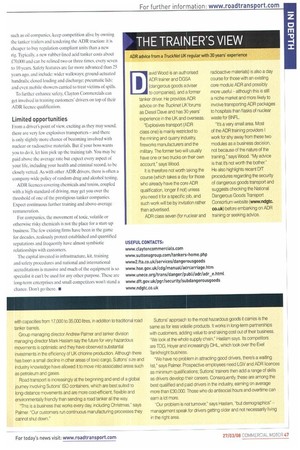THE TRAI ER'S VIEW
Page 47

If you've noticed an error in this article please click here to report it so we can fix it.
ADR advice from a TruckNet UK regular with 30 years experience
avid Wood is an authorised ADR trainer and DGSA (dangerous goods adviser to companies), and a former tanker driver. He provides ADR advice on the Trucknet UK forums as Diesel Dave and has 30 years' experience in the UK and overseas.
"Explosives transport (ADR class one) is mainly restricted to the mining and quarry industry, fireworks manufacturers and the military. The former two will usually have one or two trucks on their own account," says Wood.
It is therefore not worth taking the course (which takes a day for those who already have the core ADR qualification, longer if not) unless you need it for a specific job, and such work will be by invitation rather than advertised.
ADR class seven (for nuclear and radioactive materials) is also a day course for those with an existing core module ADFland possibly more useful although this is still a niche market and more likely to involve transporting ADR packages to hospitals than flasks of nuclear waste for BNFL.
"It's a very small area. Most of the ADR training providers I work for shy away from these two modules as a business decision, not because of the nature of the training," says Wood. "My advice is that it's not worth the bother." He also highlights recent DfT procedures regarding the security of dangerous goods transport and suggests checking the National Dangerous Goods Transport Consortium webstte (www.ndgtc. co.uk) before embarking on ADR training or seeking advice.




























































































































































